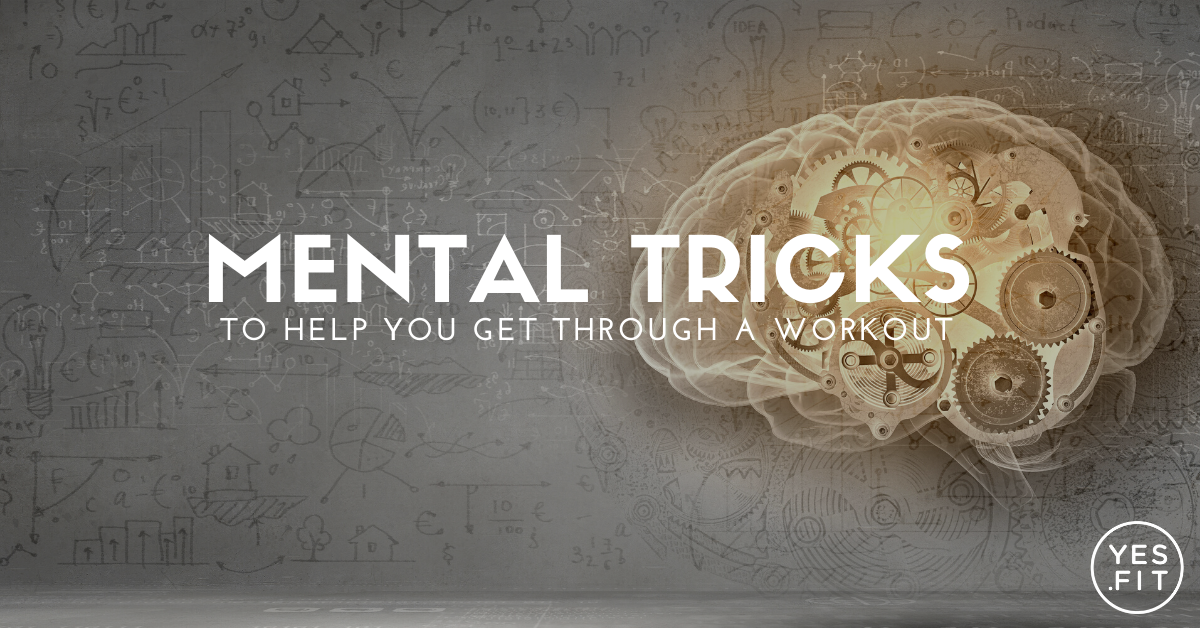Mental Tricks to Help You Get Through a Workout

Mental Tricks
No matter if you’ve been a fitness fanatic for years or are just beginning your fitness journey, there may be days where you don’t feel like exercising. Sometimes negative thoughts about taking a long run suddenly seem tedious or your schedule feels too busy to fit in any form of physical activity. But skipped days can turn into skipped weeks, which can waste all your previous efforts. For many, these times can sabotage physical activity goals altogether.
Fortunately, there are mental tricks that can help you get through your workout even when your will wants to give up. And learning a few of these tricks can help you avoid letting your fitness goals fall through the cracks. So, let’s begin with the basics and some of the best mental tricks to help you stick with your workout program.
Mental Tricks to Get Through Your Workout
Push out negative thoughts and replace them with positive affirmations. Negative subconscious thoughts often play in the background of the mind, causing one to skip the gym or end a workout early without ever realizing why.
Negative self-talk is why positive affirmations have become popular with many successful people; they work well when used consistently and are easy to do. And the best part is that the more you use them, the less room your brain has for negative thoughts that can sabotage any workout.
Update your playlist with your favorite music. Whether you work out at the gym or take a long run or walk on your treadmill at home, upbeat music can get you through it. Certain music can make you feel energetic, giving you that extra edge during your training time. At the same time, at least one study showed that those who listen to music while exercising had an increased tolerance to physical activity and were able to exercise longer. So find the music that makes you move and you might even enjoy your workout more. Yes.Fit has a curated Spotify playlists for most the races.
Know your ending point. When training gets tough, whether you do sprints at the park or an intense HIIT class at the gym, there may be days where you feel like calling it quits. But ending your planned workout too early makes it too easy to do it again next time, setting up a pattern that won’t help you reach your goals.
Instead, set a mental endpoint. For example, remind yourself there are only a few more reps to do or 30 seconds until the intensity is lowered. Imagine an endpoint that you can tolerate, like the end of the current song or the end of the “hill” your stationary bike is climbing and focus on that instead of the current discomfort.
This is one way to tap into your inner creativity and mentally break up your routine into smaller bits, so you know the end is closer than it seems.
Shorten your workout time. An hour-long workout is a common goal for many who are trying to lose weight or improve their fitness level. This may be because classes at gyms are often 60 minutes long, while the average workout DVD is 50 to 60 minutes. But then, life gets busy and that hour may begin to feel like a big chunk out of the day.
When life gets too busy or you are just beginning to add physical activity into your schedule, aim for a shorter workout duration. This helps limit any negative thoughts about no time for exercise and helps you feel better about it.
Plan for five or ten minutes of exercise when you are beginning a new routine or when your schedule feels overwhelming. This is enough time to get your blood circulating, raise your heart rate and even help alleviate stress. For many, following this plan easily evolves into longer workout times as physical fitness begins to feel good both mentally and physically.
Visualization is a mental trick that many athletes use. It can help you prepare for a race, competition or a workout. Take a few minutes to see yourself going through your routine as you feel yourself stronger and fit. Imagination is an important tool that can help you feel energized and confident while helping you overcome any barriers to fitness success.
Visualization also works to improve your workout results. Many athletes use visualization to win races and build muscle. To get through a tough workout, try visualizing the results you want to see as you are doing the exercise. This can help you get more from your workout while helping you stick with it through the tough days.

Smile and you will not only feel better, but you will pass positive energy to others. Studies show that smiling helps one feel happier and more positive and can help you recover from stress much quicker and easier. (1) A smile can fill you with positive energy, so you are able to stick with your workout and see it through to the end.
Don’t think about it too much. For some, mentally planning or visualizing a workout before training is key to powering through it. But for others, thinking about the physical activity may lead to talking themselves out of exercise instead enjoy the warmth of the blanket or the comforts of home.
If the latter sounds like you, try focusing your mind on other things, like your goals, your end results, or a reward for your hard work. Some people prefer to simply not think at all and instead, go through the motions of getting ready.
To do this, simply get ready for your workout by putting on your gym clothes, packing your gym bag or getting into your car and driving to your workout destination while trying to keep your mind clear of thoughts.
Once you begin your training, try not to think about how hard it will be or how tired you feel. This is a simple practice in mindfulness to help you become present in the moment, which can help you reach your goals easier and reduce stress.
Conclusion
There are many mental tricks to help you get through a workout, and sometimes it might be a matter of trial and error to see what works best for you. But keep it fresh, keep it fun and be kind to yourself, and remember that practicing the right mental tricks will help you stick with your fitness routine in the long run.
References:



















